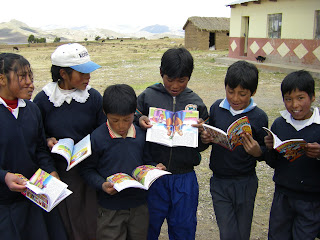Today, for the first time in my travels abroad, I have felt an overwhelming sense of pride and excitement as a U.S. citizen. Last night, watching the CNN projections in a packed room of expats, university students in study abroad programs, diplomats, international workers, and a few Peruvians. I cheered and screamed with everyone when Obama was officially recognized as the 44th president of the United States....
...and I was taken back to Argentina, 2003. My brother recommended that I put a Canadian flag on my backpack before I left the country. There were days when I wished I had. Everytime I met someone, be it in a cafe, in a classroom, in a club at 3am in the morning, I was asked: "You are American? Are you a Republican?" It seemed everyone disapproved of the US then, and Republicans were faced with harsh responses from foreigners. A Republican house-mate of mine, from Louisianna had some scary run-ins that year in Argentina. One day, she jumped in a cab, and the driver asked her where she was from. When she responded "Los Estados Unidos" the driver began to scream, literally scream out his window "I HAVE THE WAR IN MY TAXI!" She threw him a few pesos as he stopped at the next stoplight, and promptly jumped out.
Being in Latin America during the past 8 years has not always been frightening, but it certainly has been tough. Most people are consiencious that the general public is not responsible for many of the decisions the Bush Administration made. Still, there was a sense of resentment and judgment passed on the American population for having allowed its leadership to lead us to where we...and the world are today.
But last night, I felt a sense of admiration for my country, for my nationality. I cheered with my fellow Americans as Obama called out to us, "And to all those watching tonight from beyond our shores, from parliaments and palaces, to those who are huddled around radios in the forgotten corners of the world, our stories are singular, but our destiny is shared, and a new dawn of American leadership is at hand."
Today, we Americans abroad, have a new sense of duty and position in our global community, as we are lead by a man who embodies a spirit of diversity and diplomacy that is called for from the shores of the Atlantic and Pacific oceans to the shores of the highest navigable lake in the world.
A brief history of the Aymara in Peru
-
*IRPA’s mission is to develop and enable the productive and organizational
skills of less favoured populations in the highland region through the
managemen...
16 years ago


 Four days later we get the call that my visa has been approved! FINALLY. Now, I just have to return to Bolivia in the coming week, obtain my visa from the Consulate of Peru in La Paz and come back into Peru.
Four days later we get the call that my visa has been approved! FINALLY. Now, I just have to return to Bolivia in the coming week, obtain my visa from the Consulate of Peru in La Paz and come back into Peru.




